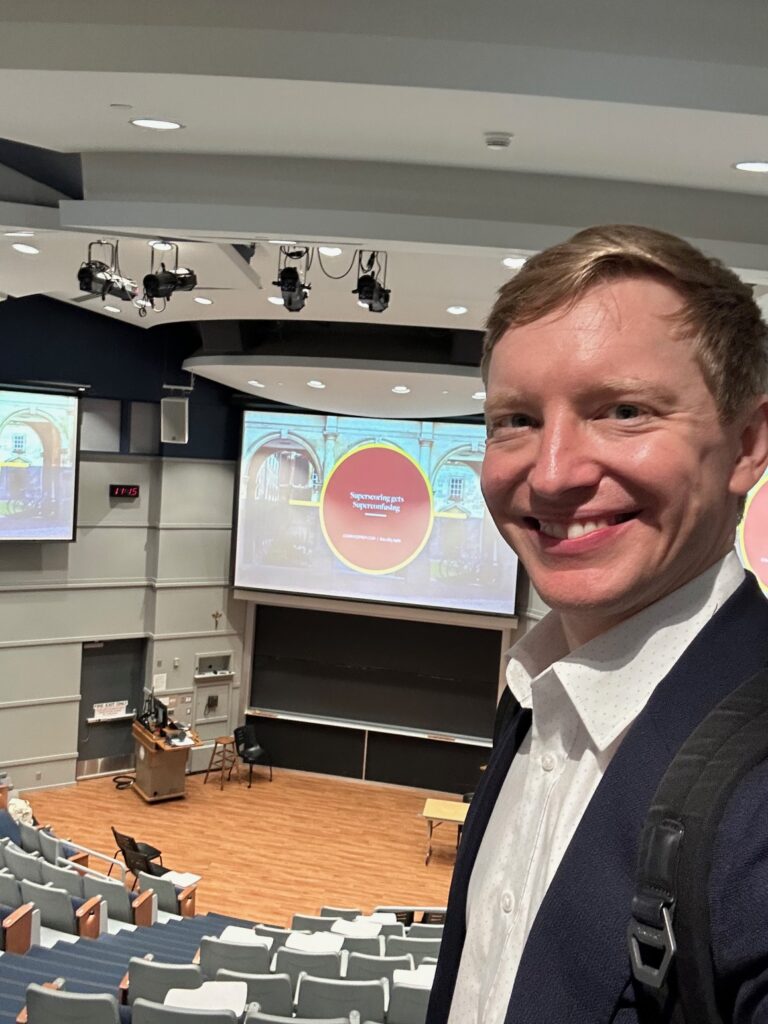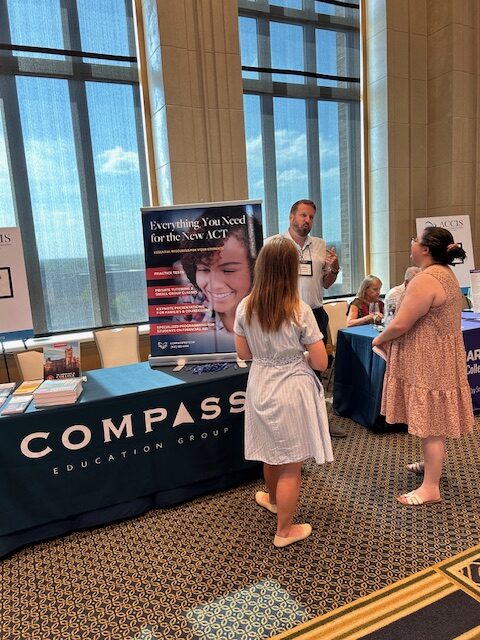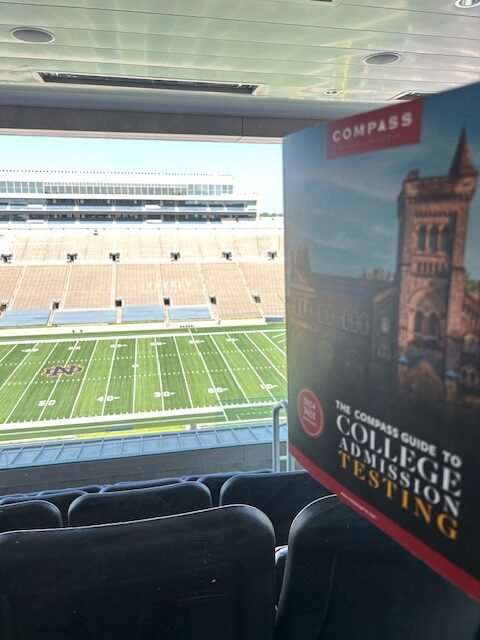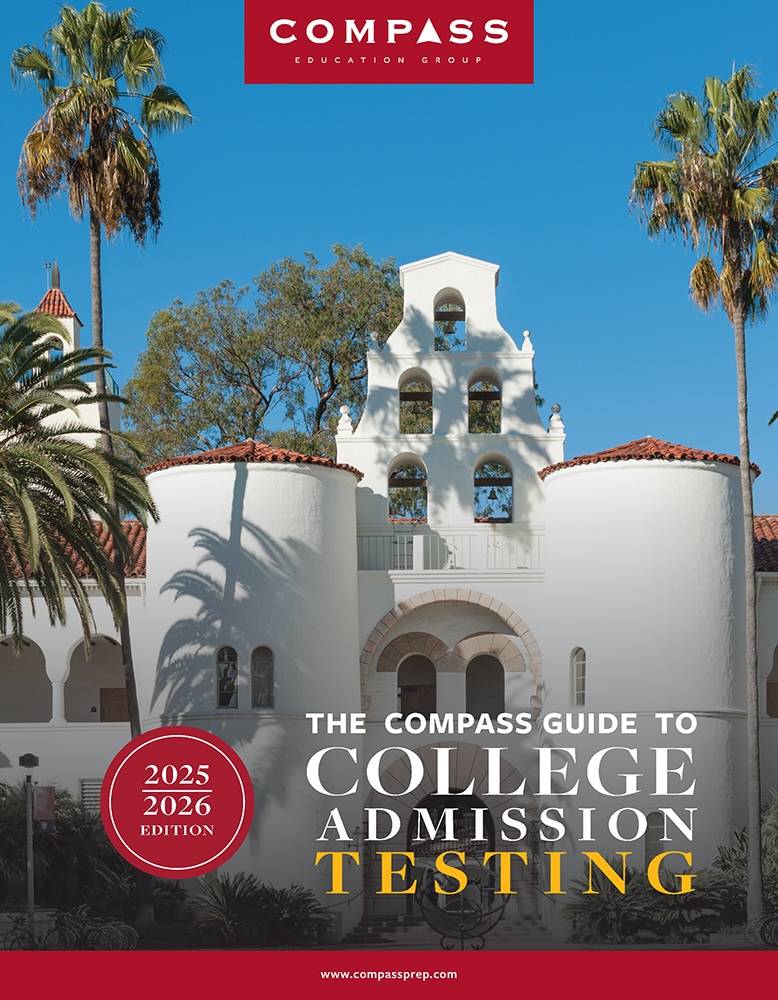ACCIS 2025 brought me back to Notre Dame’s campus for the first time since high school, when I froze through a football game against BYU, unable to drink enough hot chocolate to stay warm.
This time, we all got more warmth than we bargained for. Pardon the sweaty face. By 10 am on Sunday, the temperatures in South Bend soared well into the 90s. That same morning, I had the honor of presenting to ~50 counselors entering their first year in the profession. Thank you to Chad Fulton, from St. Andrew’s Episcopal School, for all the coordination, including the lecture hall change due to an AC issue, setting the stage for Compass and me, and helping pass out Guides.
That same morning, I had the honor of presenting to ~50 counselors entering their first year in the profession. Thank you to Chad Fulton, from St. Andrew’s Episcopal School, for all the coordination, including the lecture hall change due to an AC issue, setting the stage for Compass and me, and helping pass out Guides.
We began, naturally, by deciding what ride at Disney World best represents the past decade—and especially the past 5 years—of standardized testing. Kudos to the counselor (and tag yourself in the comments that this was you!) who said the teacups. We spin and we spin and we all get dizzy and then we’re spit out right back where we started? Feels accurate, because although the testing landscape has changed dramatically, we are in a way back where we started, with students taking tests at pre-pandemic numbers, only with the dizzying extra step of deciding how and when to use their scores at popular colleges that do not require them.
One of the highlights of the workshop, then, was role playing through this “submit / withhold” quandary. After getting feedback from counselor friends that this takes up lots of time in their meetings with students, it felt important to simulate it as best we could, even though the exercise is inescapably reductive. Still, the narrow lens of grades and test scores provided the expedient to unearth the many “it depends” realities yoked to the decision of how and when to use a score. Here it goes:
Sally Student attends a rigorous college prep high school, achieving mostly As, a few Bs, with an ambition to study pre-med. She’s taken 3 APs, is on JV golf, started a minigolf club, and volunteers at a local hospital. She has a 1400. She’s applying to: Loyola University Maryland (1190–1350), Fordham University (1320–1450), and Notre Dame (1440–1540).
Should she submit or withhold her score?
The show of hands was unanimous in favor of submitting the 1400 to Loyola and Fordham. But what to do at Notre Dame, where a 1400—an outstanding score, 93rd percentile nationally—is still 40 points below their 25th percentile? Many voiced a stance in favor of submitting. An admissions reader from Notre Dame attended the session, and agreed. He said that, even though a 1400 was lower than the 25th percentile threshold, the score would send all the right signals, especially if the math subscore was strong. ND would rather see it than not, and they would have no concerns whatsoever about that student’s ability to handle a rigorous pre-med program.
Check out the rest of the presentation here.
The next day, Adam and I led a full house of counselor friends and colleagues into more choppy testing waters with “ACT’s Rapid Response to a New Testing Landscape.” Here’s an abridged version of the deck, and if you were there in person, IKYK what was for the live audience only :).
If you missed it, here’s our guidance in one looooooong sentence:
Despite all the changes to ACT, and some of the headaches that will ensue from the “enhanced” version (more volatile scaling, 31 flavors of Science policies, different colleges evaluating the same portfolio of ACT scores differently depending their reporting, superscoring, and Science preferences), let’s not just throw up our hands and tell students to default to the SAT, as, just as with Classic ACT / SAT, there are still lots of students who do better on ACT, including students who tend to be “grinders,” speedy test-takers, softer-scoring in math, and prefer a paper option; also, there will be a new concordance coming (best guess, it’s ready by Spring 2027).
As for highlights, there were many:
- Our Guide excerpts for counselors—e.g. our 106-page Guide broken into some greatest hits, like a 4-pager on “Popular Testing Timelines”—struck a chord. We put up the slide, but not for long enough, as upon advancing to the next slide, a chorus of “waits!” greeted us, and we had to backtrack.
- My colleagues and I had been curious about the following question: how do the volatility and standard error of measurement on Core (aka Enhanced) compare to Classic; or, in other words, how much can we trust any particular scaled score on Classic says the same thing as any particular scaled score on Core? I heard a gasp ripple through the audience when we showed two graphs comparing scaled scores on English and Math. Look at slides 37 and 38. A big thanks to Jason and Hannah for their work on the slides.
- The discussion was (unsurprisingly) brilliant. In illustrating the variation in how colleges will evaluate Enhanced ACT scores, Dr. Monique Equavoen at Westridge School sparked discussion on the extent to which Science is suppressible, particularly given the ubiquity of self-reporting and score choice policies. Another excellent question came from the middle of the room—which I could not see from where I was in the front, so please tag yourself if this was you!—about whether readers, especially junior readers, who tend to do the first pass of an application, will, candidly, read all that deeply into the ripple effect of scores with/without Science, single-test vs. composite, and so on.
Finally, we closed out the conference at the sponsor happy hour, held at the skybox level of Notre Dame Stadium. I think, together, Adam and I chatted with folks from most of the 50 states, and further afield, too—Kurt Nichols, now at the American International School in Bangkok, stopped by to say hello. The amount of appreciation I absorbed on behalf of our Compass colleagues who weren’t there—for the smoothness of our practice testing operation, the depth of the data analysis we provide in our school keynotes, the effectiveness of our small group classes and 1-1 tutoring—was so humbling, that, at risk of being a walking cliche, I had to take this photo and add one more to the legacy of ND football riffs:
The amount of appreciation I absorbed on behalf of our Compass colleagues who weren’t there—for the smoothness of our practice testing operation, the depth of the data analysis we provide in our school keynotes, the effectiveness of our small group classes and 1-1 tutoring—was so humbling, that, at risk of being a walking cliche, I had to take this photo and add one more to the legacy of ND football riffs:


